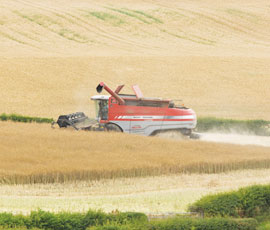Harvest roundup: Here comes the sun

Some welcome fine weather has enabled combines to return to the fields in many parts of the country, although crops and ground conditions remain quite wet.
In Suffolk, Carl Driver was getting on well with harvest at Brittons Farm, Bury St Edmunds, having just started on winter wheat.
“We’ve cut about 500ha of oilseed rape and 200ha of winter barley, and have done about 60ha of winter wheat,” he said.
Both the rapeseed and barley yielded well, but the wheat did not look as promising, coming off at 20.5% moisture today (9 August).
“I’m not going to comment on the Gallant much, apart from to say that it’s variable. It’s got the milling quality, except in the specific weight department.”
Nationwide, farmers had cut less than 1% of the wheat area by 7 August, said a report by ADAS.
Winter barley harvest was about 60% complete, with rapeseed about 35% through, both of which were yielding about average.
“Harvest progress is 10% behind the latest in recent years, and wet soil conditions are hampering progress,” said the report.
“Pre-harvest rainfall is a crucial factor for mycotoxin risk so the continuing wet weather means that risks are still increasing.”
In France, harvest was drawing into the latter stages, with 59% of its wheat cut by 31 July, and yields proving better than expected.
The French Farm Ministry estimated the wheat crop at 36.6m tonnes – 8% up on last year, although it did have concerns over quality following the wet weather, said a report by HGCA.
The winter barley and oilseed rape harvests were almost finished, with 43% of spring barley cut by 2 August.
Despite a likely 50% drop in Russia’s exportable surplus, Russian officials decided not to ban grain exports in a meeting today, although domestic food security would remain a government priority.
“Given the strong current export activity in Russia, we can soon expect some limitation of the export activity from this country as Russia can not export more than it has,” said a report by analyst Agritel. “Export taxes remain an option too.”
Back on home soil, James Fuggle had finished combining oilseed rape at Chessons Farm, Wadhurst, East Sussex, and hoped to move onto oats tomorrow.
“After the oats we’ll move into the wheat – we’ve had to spray it time and again but whatever you spray it with it won’t create sunshine,” he said.
“I don’t think we’ll win any gold medals in farming this year.”

